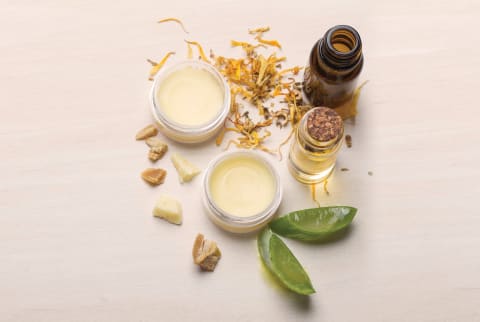Advertisement
An Easy DIY Recipe For Your Own Signature Scent


Making your own perfume means you have more control over the ingredients—which is ideal if you want something more natural—but also the final scent profile. After all, finding your signature scent is a deeply personal thing.
It is a little more involved to make a solid perfume, as this method requires heating your ingredients. However, solid perfumes are ideal for on-the-go travel and application (no spillage and they tend to not take up as much space!).
This recipe shows you how to make 1 ounce of solid perfume, but feel free to adjust the proportions if your finished container is smaller or larger.
You will need:
- A double boiler setup
- 1 tablespoon carrier oil, such as jojoba, sweet almond, or grapeseed oil
- 2 teaspoons beeswax or a vegan wax like carnauba wax
- A wooden spoon or chopstick for stirring
- 1 vitamin E softgel capsule (this is an optional ingredient, but you can add if you wish to extend your perfume's shelf life longer than 6 months—otherwise, plan to use your perfume within 3 to 6 months)
- Your essential oil blend
- A small container for your finished solid perfume
Your step-by-step guide to making a solid perfume
Here, an easy-to-follow recipe:
Prep your double boiler
I use a glass Pyrex measuring cup placed in a pot filled with a few inches of water. If you have a true double boiler, that works too. Have all your materials set up and ready to go, including the container you want your solid perfume to go in, because this process goes fast.
Bring the water to just below boiling
Bring the water in your pot or the bottom of your double boiler to hot but not boiling. The water should not actually boil during this entire process; you just need it warm enough to melt the wax.
Add your carrier oil
If the container you will be putting your finished solid perfume in is 1 ounce, pour 1 tablespoon of your carrier oil into the Pyrex measuring cup or the top of the double boiler.
Introduce the wax
Add 2 teaspoons wax to the oil and occasionally stir with a wooden spoon or chopstick until the wax is completely melted. For a harder texture of solid perfume once it's cooled, add equal parts oil and wax. In this case, you would use 1 tablespoon of oil and 1 tablespoon of wax.
Blend in the vitamin E
Once the wax has liquefied, add vitamin E if you want (puncture one soft-gel capsule, squeeze the liquid into the wax mixture, and combine), then take it off the heat.
Add your essential oils
Quickly add 15 to 17 drops of your essential oil blend to the wax mixture and combine before it solidifies.
Transfer to your container
Carefully pour your perfume into its container. The smaller the container, the faster it will cool and solidify. Try not to move or disturb the perfume in any way as it cools so that it has a nice smooth finish. You can put the cap on it once it has cooled to room temperature, but place it somewhere it can rest and continue to harden for at least 24 hours.
How to go vegan
To make vegan solid perfumes, use carnauba wax instead of beeswax. You can also experiment with substituting shea butter, but it will result in a softer product. Start with equal parts shea butter and liquid oil.
Another option for making vegan solid perfume is coconut oil, which is solid at room temperature. Melt it in a double boiler on low, and when it is completely liquefied, take it off the heat, pour into containers, and add the desired essential oils right away before the oil cools.
Try adding an equal amount of olive or jojoba oil to the melted coconut oil for a softer texture.
Unrefined coconut oil has a tropical scent, but you can use refined coconut oil for a base with no scent.